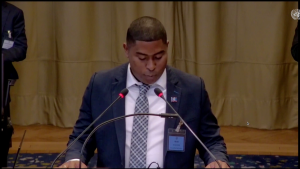Belize Addresses Climate Change at The Hague
The Government of Belize recently presented its case at the International Court of Justice regarding the responsibilities of states in tackling climate change. These hearings are a historic step towards global climate accountability, aiming to clarify what countries must do to reduce climate impacts and protect vulnerable populations. Doctor Kenrick Williams, C.E.O. in the Ministry of Sustainable Development and Climate Change, highlighted the severe threat climate change poses to Small Island Developing States like Belize. He emphasized that this Advisory Opinion is a crucial opportunity for the international community to define state obligations in addressing this global crisis. For Belize, the stakes are incredibly high. Doctor Williams pointed out the significant challenges Belize faces, such as rising sea levels, warming oceans, and more frequent and severe storms. He shared the example of Monkey River, a community suffering from severe coastal erosion and economic losses, to illustrate the broader climate crisis affecting SIDS worldwide.

Kenrick Williams
Dr. Kenrick Williams, C.E.O., Ministry of Sustainable Development
“Belize is uniquely vulnerable to the impacts of climate change, our nation is home to the second largest coral reef system in the world, a UNESCO World Heritage Site, and the largest tract of forest outside of the Amazon in Central America. These are not just natural treasures, they are lifelines for our biodiversity, economy and cultural heritage, yet they are under siege from rising sea levels, warming oceans, and increasingly severe storms. Hurricane Lisa, alone, in 2022, caused damages of nearly US one hundred million dollars, affecting nearly forty percent of our population. Let me take one example of the profound human and environmental toll of climate change on Belize and on Small Island Developing States, more generally. That is the case of Monkey River, once a thriving community engaged in fishing and ecotourism, it is now in crisis. Rising sea levels and intensifying storms, unmistakable markers of climate change, have stripped away its coastline with some areas losing up to two meters annually. This underscores the urgent need for clarity on states’ obligations under international law to protect vulnerable nations.”
Despite these challenges, Belize has shown resilience by protecting over forty percent of its territory, shifting to renewable energy, and creating innovative financing mechanisms like the Blue Bonds for marine conservation. The I.C.J. is now considering important questions about state duties to reduce greenhouse gas emissions, prevent environmental harm, and support adaptation measures. Belize has urged the court to provide clear guidance to enhance accountability and international cooperation under frameworks like the United Nations Framework Convention on Climate Change and the Paris Agreement.







Facebook Comments